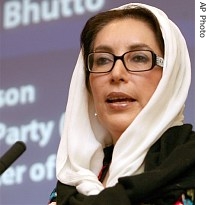2007年VOA标准英语-Pakistan Opposition Leader Says Musharraf Must(在线收听)
Washington
07 August 2007
Former Pakistani prime minister Benazir Bhutto says President Pervez Musharraf will have to relinquish his role as military chief if he wants to reach a political accommodation with the opposition. In an exclusive interview with VOA correspondent Gary Thomas, the ex-leader of Pakistan says time is running out for both sides to reach some kind of agreement.
 |
| Benazir Bhutto |
Ms. Bhutto would neither confirm nor deny that she met with General Musharraf in Abu Dhabi recently, as was widely reported. But she said the Pakistani leader is making promises, but no concrete gestures toward a return to civilian rule.
"One thing is certain, that time is running out for General Musharraf's side to reach some kind of an accommodation with the opposition," said Ms. Bhutto. "And unless they can come up with upfront gestures I think it is going to be very difficult, given that nothing has happened since the process began."
Ms. Bhutto, who served twice as prime minister of Pakistan in the 1990s, lives in exile and faces charges of corruption if she returns. She has consistently denied the charges, saying they are politically motivated. She says the lifting of the ban on her return and the dropping of the charges against her would be the kind of upfront gestures she is looking for.
General Musharraf took power from Prime Minister Nawaz Sharif in a bloodless coup in 1999. Ms. Bhutto is adamant that if General Musharraf wants to have any future political role under any negotiated deal with her Pakistan Peoples' Party, he must give up his military role.
"The uniform is not negotiable," she said. "It is something that is not constitutionally permissible, and it is not negotiable because the whole country is against it, and PPP has spent its whole life fighting to make a distinction between democratic government and military government. And having the uniform blurs the distinction between military rule and a civil role."
Parliamentary and presidential elections are to be held sometime in the next few months in Pakistan. Which comes first is at issue.
The president is elected by an electoral college made up of the national parliament and the four provincial assemblies. General Musharraf and his allies have control of the current parliament, which would virtually reassure his reelection. But the opposition says the next president has to be chosen by the next parliament and assemblies.
Ms. Bhutto noted that Pakistani courts are becoming more assertive and independent after General Musharraf's dismissal of the Supreme Court's chief justice - which sparked widespread protests - was overturned. She says the presidential reelection issue might be legally challenged.
"And of course there is the whole issue of the [presidential] reelection from the present assembly, which in the view of the PPP would be illegal but in General Musharraf's view is legal," said Ms. Bhutto. "So I think that is an issue that is probably going to end up in the courts."
Ms. Bhutto says if General Musharraf seeks reelection before general elections are held, her party might resign from parliament or boycott elections.